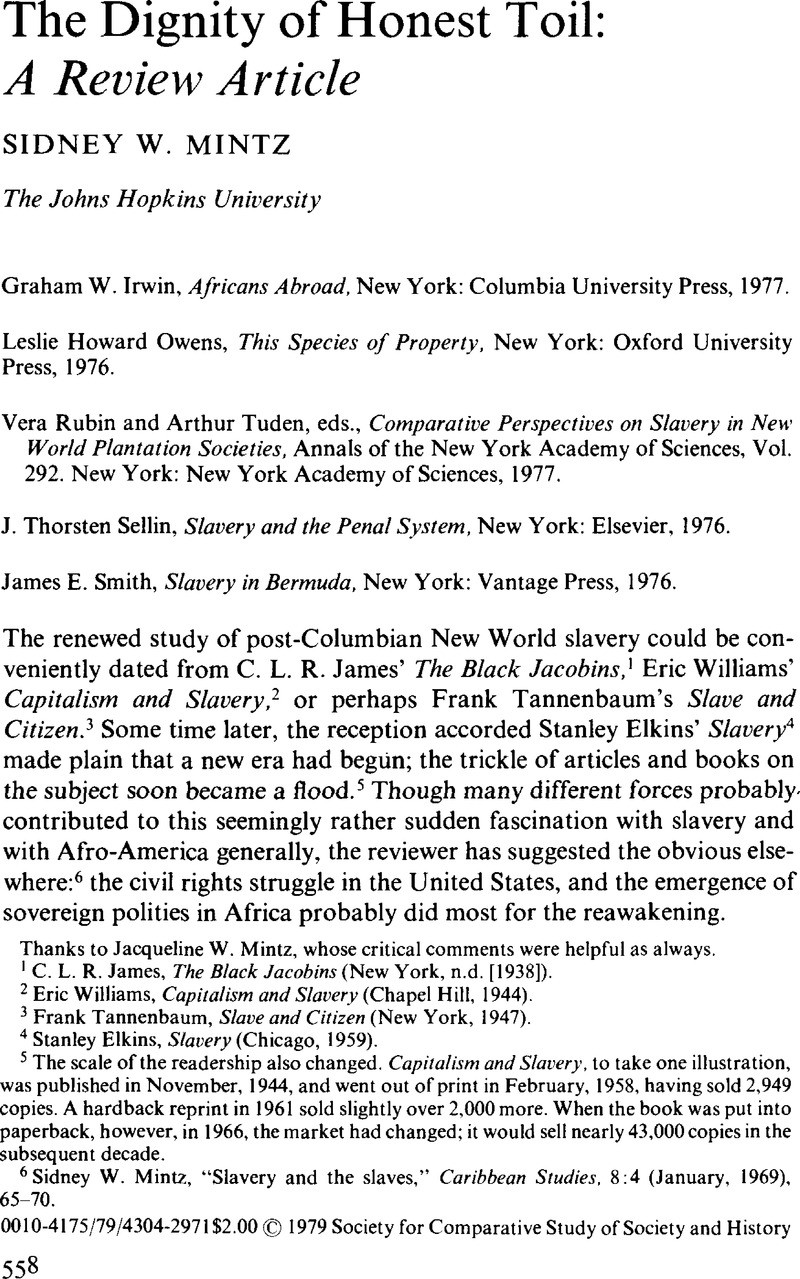Article contents
The Dignity of Honest Toil: A Review Article
Published online by Cambridge University Press: 03 June 2009
Abstract

- Type
- Agricultural Labor and Capitalism
- Information
- Copyright
- Copyright © Society for the Comparative Study of Society and History 1979
References
Thanks to Jacqueline W. Mintz, whose critical comments were helpful as always.
1 James, C. L. R., The Black Jacobins (New York, n.d. [1938]).Google Scholar
2 Williams, Eric, Capitalism and Slavery (Chapel Hill, 1944).Google Scholar
3 Tannenbaum, Frank, Slave and Citizen (New York, 1947).Google Scholar
4 Elkins, Stanley, Slavery (Chicago, 1959).Google Scholar
5 The scale of the readership also changed. Capitalism and Slavery, to take one illustration, was published in November, 1944, and went out of print in February, 1958, having sold 2,949 copies. A hardback reprint in 1961 sold slightly over 2,000 more. When the book was put into paperback, however, in 1966, the market had changed; it would sell nearly 43,000 copies in the subsequent decade.
6 Mintz, Sidney W., “Slavery and the slaves,” Caribbean Studies, 8:4 (01, 1969)65–70.Google Scholar
7 Herskovits, Melville J., The Myth of the Negro Past (New York, 1941).Google Scholar
8 Foucault, Michel, Discipline and Punish (New York, 1977).Google Scholar
9 Goffman, Erving, Asylums (New York, 1961).Google Scholar The essay entitled “On the characteristics of total institutions” first appeared in a shorter version in the Symposium on Preventive and Social Psychiatry (Washington, 1957).Google Scholar It is a little surprising, perhaps, that Elkins made no use of the Goffman essay, but just short of astonishing that Foucault acknowledges no familiarity with it.
10 Shaw, A. G. L., Convicts and the Colonies (London, 1966), p. 27.Google Scholar
11 Rusche, Georg and Kirchheimer, Otto, Punishment and Social Structure (New York, 1939).Google Scholar
12 Holdsworth, W. S., A History of English Law (London, 1922–1924), II, p. 36.Google Scholar
13 Op. cit. IV, p. 397.Google Scholar
14 Rev. Bridges, G. W., The Annals of Jamaica (London, 1827), I, pp. 507–8.Google Scholar
15 Smith, Adam, An Inquiry into the Nature and Causes of the Wealth of Nations (New York, 1937 [1776]).Google Scholar
16 Ibid., p. 532. Italics added.
17 Radbruch, Gustav, “Der Ursprung des Strafrechts aus dem Stande der Unfreien,” reprinted in Gustav Radbruch, Elegantiae juris criminalis (Basel, 1950).Google Scholar
18 Rusche, and Kirchheimer, , op. cit. See especially Sellin's introduction.Google Scholar
19 Sellin, Thorsten, Slavery and the Penal System (New York, 1976), p. vii.Google Scholar
20 It is striking to discover, on reading Rusche and Kirchheimer, that much of Foucault's point of view is prefigured there, though packaged rather differently. One is tempted to wonder whether Foucault himself fully recognizes it.
21 Sellin, , op. cit.Google Scholar and ibid.
22 Sellin, , op. cit., p. vii.Google Scholar
23 Sellin, ibid., p. viii.
- 1
- Cited by


